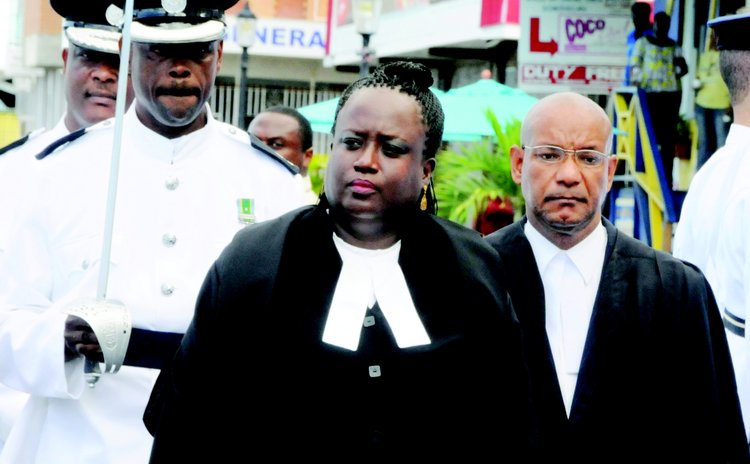Judge hears arguments in the judicial review of the general elections treating case

Justice Bernie Stephenson last week heard arguments from both sides in a judicial review matter concerning the interpretation of the House of Assembly Act.
Recall that earlier three citizens-Mervin John Baptiste, Antoine Defoe and Edingcot St. Valle- had filed criminal complaints against members of Government for treating during the election campaign leading up to the December 2014 general election.
In their complaints, the citizens allege that Government ministers "worked together to corruptly, directly and/or indirectly influence the results" of the poll. However, Anthony Astaphan SC, who represents the ministers, claims that the magistrate erred when he issued summons to have the defendants come to court.
In his arguments before Judge Stephenson last week, Astaphan said the citizens' complaints ought to have been filed via an election petition but instead they have waited five months after the election to file criminal complaints and that was wrong in law.
"If that charge for treating was contained in an election petition and filed 23 days after the return it would be struck out by the High Court for failing to meet the 21 days (requirement)," Astaphan told the court.
In this case, the law, he said, relates to the House of Assembly Act. "You must bring that charge in an election petition within 21 days…the Magistrate has no business in this when it comes to the election of people in the House of Assembly," he said.
He further argued that the complaints do not state the offenses.
"It does not say who…they have said people attended the concert and were influenced. Nothing in the complaints says what happened; the law does not involve in speculation; the law does not know the Dominican electorate," Astaphan said.
He added that the people who turned up for the concert came from everywhere. He asked the court to agree with his argument and if it does, that would be the end to the matter.
However, in her rebuttal Cara Shillingford, who is representing the citizens, told the court that the statutory interpretation is central to the case.
"It's the duty of the court to interpret and apply the law; parliament's duty is to enact the law. Where the meaning of the law is clear the court should apply the plain meaning of the legislation," she opined.
She told the court that the interpretation of sections 56 and 59 of the House of Assembly Elections Act is important to the case.
Section 56 of the Act states that someone is guilty of treating if that person "corruptly, by himself or by any other person, either before, during, or after an election, directly or indirectly, gives, or provides or pays" the expenses of giving or providing any food, drink, entertainment to or for any person for the purpose of corruptly influencing that person, or any other person, to vote or to restrain from voting at the election.
If someone is found guilty the penalty for treating is a fine of $5000 or imprisonment for six months.
During her presentation, Shillingford asked the court to interpret sections 56 & 59 together.
She argued that contrary to Astaphan's assertions there are no election petitions before this court.
"Private criminal complaints were filed…Learned Senior Counsel is inviting the court to create legislation from the Bench and that is not the function of the court," she said. "The Learned Magistrate properly considered the complaints and made a decision to issue summons."
She added that "judicial review cannot help and the complaints are sufficiently clear."
After hearing the lawyers' arguments Justice Stephenson set June 24, 2016 at 3.30pm as the deadline to file closing arguments.
And she added: "You are now number 16 in judgments I have to deliver; I will try my best to get it out as soon as possible."




